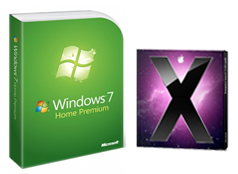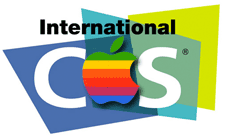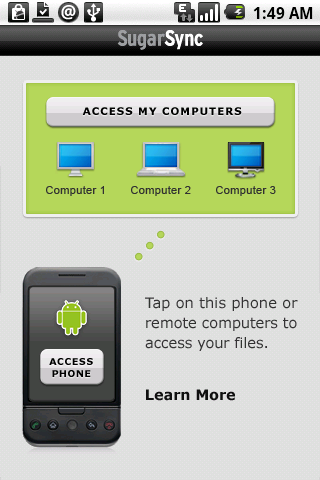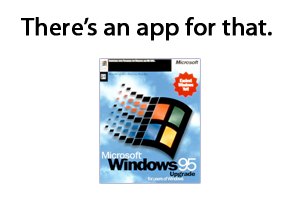 Daring Fireball’s John Gruber has posted a piece titled “Microsoft’s Long, Slow Decline.” As with most of what he writes, it’s both provocative and thought-provoking, whether you agree with all of it, some of it, or none at all.
Daring Fireball’s John Gruber has posted a piece titled “Microsoft’s Long, Slow Decline.” As with most of what he writes, it’s both provocative and thought-provoking, whether you agree with all of it, some of it, or none at all.
Gruber writes about such matters as Microsoft’s recent lackluster financial results, the recent news of Apple’s utter domination of the high-end retail PC market, and the cartwheels Microsoft COO Kevin Turner supposedly turned in the hallways over Apple’s response to Microsoft’s “Laptop Hunters” commercials. He mentions Windows 7 and says:
But no one seems to be arguing that Windows 7 is something that will tempt Mac users to switch, or to tempt even recent Mac converts to switch back. It doesn’t even seem to be in the realm of debate. But if Windows 7 is actually any good, why wouldn’t it tempt at least some segment of Mac users to switch? Windows 95, 98, and XP did.
I haven’t heard anyone contend that Windows 7 will convince Mac switchers to come back, either. Then again, I haven’t heard anyone say it’s not good enough to change the game. But it’s an interesting question.
It’s also one that’s hard to answer just yet. For one thing, while Windows 7 looks quite promising, we don’t yet know what PC manufacturers are going to do with it, and there’s a real chance that at least some of them will muck up a respectable OS with demoware, adware, and various other forms of unwantedware. For another, Windows 7 will compete against Apple’s Snow Leopard, an OS which doesn’t go on sale until September and which–unlike Windows 7–has had no period of public preview.
Based on the months I’ve spent running pre-release versions of Windows 7, I think there’s a good chance it’ll have a meaningful impact on the whole “PC or Mac?” question. It significantly narrows the gap between OS X and Windows for usability and overall polish, and while it doesn’t eradicate OS X’s lead, it should leave Windows users at least somewhat less likely to abandon ship.
But Gruber wasn’t talking about whether Windows 7 will stop more people from leaving Windows; he was talking about whether it’ll convince Mac users to switch from Macs, and saying that if Windows 7 is really good, it will.
I’m not so sure. History suggests that people don’t like to switch operating systems and the most striking significant shifts in operating-system market share have happened when one OS has been on alarmingly shaky ground. Back when the exodus from Macs to Windows 95 and Windows 98 that Gruber refers to happened, Apple’s OS was floundering and it wasn’t clear that the company was going to survive. And Apple has made major inroads over the past couple of years in part because Windows Vista was such a mediocrity.
Apple is positioning Snow Leopard as an OS that’s very much like Leopard, except faster, sleeker, and more reliable. Unless it somehow turns out to be a less appealing Leopard, it’s going to be really pleasing. People tend not to dump pleasing OSes, even if there are also other pleasing OSes. S0 I’m not going to judge Windows 7 based on there whether are meaningful quantities of Mac users who are drawn to it…


 In a blog post reporting on a journalists’ dinner with Gary Shapiro, head of the Consumer Electronics Association, the Wall Street Journal’s Ben Charny reports that that Apple
In a blog post reporting on a journalists’ dinner with Gary Shapiro, head of the Consumer Electronics Association, the Wall Street Journal’s Ben Charny reports that that Apple  The Inquirer is reporting (in its usually snarky manner*) that the
The Inquirer is reporting (in its usually snarky manner*) that the  It won’t be a truly done deal until it gets regulatory approval, but Microsoft and Yahoo have finally agreed to a partnership which, among other things, will
It won’t be a truly done deal until it gets regulatory approval, but Microsoft and Yahoo have finally agreed to a partnership which, among other things, will  Sharpcast is serious about putting its SugarSync file-syncing-to-the-cloud service on devices of all sorts. It’s already available on Windows, OS X, iPhone OS, BlackBerry, and Windows Mobile–
Sharpcast is serious about putting its SugarSync file-syncing-to-the-cloud service on devices of all sorts. It’s already available on Windows, OS X, iPhone OS, BlackBerry, and Windows Mobile–



 I continue to think of my iPhone not as a phone but as a personal computer. Which is why I continue to be so nonplussed about Apple’s
I continue to think of my iPhone not as a phone but as a personal computer. Which is why I continue to be so nonplussed about Apple’s